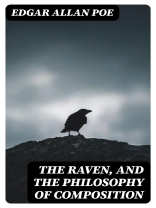Edgar Allan Poe’s ‘The Raven, and The Philosophy of Composition’ reveals the intricate interplay between poetic form and psychological depth, offering a profound exploration of despair, loss, and the obsessive nature of memory. In ‘The Raven, ‘ Poe employs a unique musicality and vivid imagery to weave a dark narrative centered around the haunting refrain of a raven’s croak. This celebrated poem epitomizes the Gothic style, characterized by its melancholic tone and exploration of the human psyche, while ‘The Philosophy of Composition’ serves as a reflective guide—a meta-commentary on the creative process behind poetry, revealing Poe’s methodical approach to literature, emphasizing unity of effect and the importance of careful composition. Edgar Allan Poe, often hailed as the master of macabre and a pioneer of the detective genre, drew deeply from his tumultuous experiences, including personal losses that colored his understanding of sorrow and isolation. His scholarly background and profound interest in the mechanics of storytelling shaped his belief that a well-crafted poem should evoke a singular emotional response, underscoring his dedication to the art of writing. This collection is an indispensable read for those intrigued by the mechanics of poetry as well as the emotional weight of the human experience. Poe’s adeptness at intertwining the analytical with the artistic invites readers to not only appreciate the beauty of his language but also engage with the underlying philosophical questions of creation and mortality.
Об авторе
Edgar Allan Poe (1809–1849) remains one of the most influential and enigmatic figures in American literature. Notably recognized for his macabre and gothic tales, Poe’s work exemplifies the romanticism movement’s fascination with the darker aspects of the human psyche. Born in Boston, Massachusetts, his literary career spanned various genres including poetry, short stories, and critical essays. Poe’s mastery of the horror genre is exemplified in works like ‘The Raven, ‘ a poem which stands as a hallmark of American poetic tradition with its haunting narrative and rhythmic complexity. Additionally, in ‘The Philosophy of Composition, ‘ Poe offers an insightful look into his meticulous and intentional approach to writing. This essay affords readers a unique window into the author’s creative process, emphasizing the importance of effect in literature. Poe’s contribution to the detective fiction genre is also significant, often crediting him as the progenitor of the detective story. His use of first-person narratives and psychological depth paved the way for modern storytelling. Despite his troubled life and mysterious death, Poe’s legacy continues to inspire and challenge readers and writers alike. His themes of loss, love, and the unknown resonate throughout his corpus of work, establishing him as a central figure in the American literary canon.












